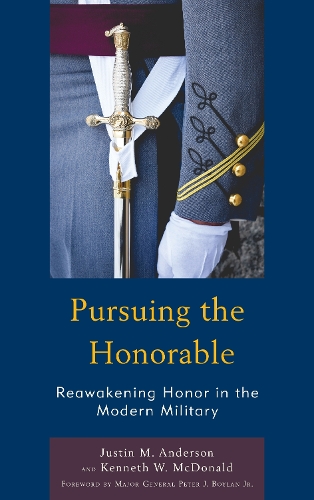
Pursuing the Honorable: Reawakening Honor in the Modern Military
(Hardback)
Publishing Details
Pursuing the Honorable: Reawakening Honor in the Modern Military
By (Author) Justin M. Anderson
By (author) Kenneth W. McDonald
Foreword by Peter J. Boylan
Bloomsbury Publishing PLC
Lexington Books
15th May 2019
United States
Classifications
Professional and Scholarly
Non Fiction
Warfare and defence
Politics and government
306.27
Physical Properties
Hardback
148
Width 161mm, Height 233mm, Spine 19mm
404g
Description
Pursuing the Honorable argues that our modern understanding of honor, as seen through example of todays military training, is deficient. To remedy this, the book returns to an understanding of the honorable good, especially manifested for philosophers like Aristotle and Cicero in a life of the human virtues. However, because honor as defined by the honorable good needs to be applicable to the 21st Century occidental world of liberal democratic values, the study includes careful attention to those conditions under which honor can once again become a live option. While special attention is given to military training, including concrete proposals for its renewal, what the study discovers extends to many forms of human life
Reviews
This book addresses the challenge of character education in the military through the prism of Virtue Ethics. This moral medium is internal to the vocation of the officer, yet conceptual incoherence infects certain virtues, such as honor. By taking on the equivocations in the concept of honor and martialing the history of philosophy to restore substantive content to the term, the authors show how rigorous analysis must accompany exhortations to virtue if character education is to be sound. This book will be gratefully received by the growing number of scholars and practitioners who believe that Virtue Ethics must be an academic emphasis at our service academies. As it is replete with practical suggestions as well as theoretical analysis, this book will also be of interest to those who teach ethics for the professions. -- Patricia Cook, Naval Postgraduate School
After a long period of near neglect, both the role honor used to play in earlier days and its subsequent demise have received quite some attention in recent years. This excellent volume adds to that growing body of literature. But it does considerably more than that: instead of merely stating how regrettable the current state of affairs is, the authors provide us with some useful insights on how honor could be brought back to life in our modern society. Although their example is the military, one of the few remaining strongholds of honor in our time, this book contains some worthwhile lessons on a possible beneficial role for honor in society at large. -- Peter Olsthoorn, Netherlands Defense Academy
Anderson and McDonald revive an important discussion of honor based in both human and practice-based virtues that are critical to the future of professions and those who serve in, and are served by them. The US Military Academy at West Point serves as a nice case study for their treatise as its developmental program models a combination of both Athens and Sparta intellectual development coupled with the building of military, physical and character skills. As all professions should, West Point continues to evolve honor development programs to make sure they are readying cadets for the ethical challenges of tomorrow. -- Tim Trainor, President, Mount St. Marys University and former dean of the US Military Academy
Author Bio
Justin M. Anderson is associate professor of Christian ethics at Seton Hall University. Kenneth W. McDonald is professor of engineering management at the United States Military Academy.
